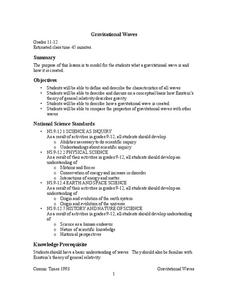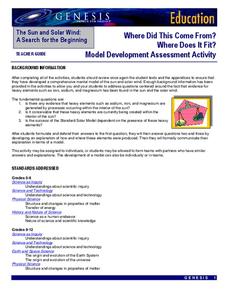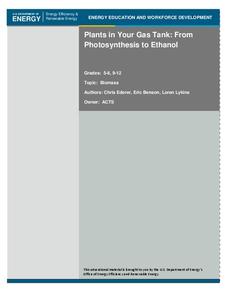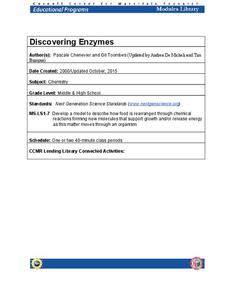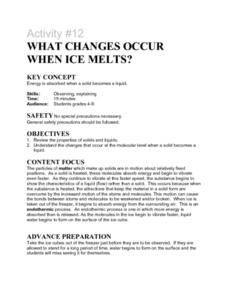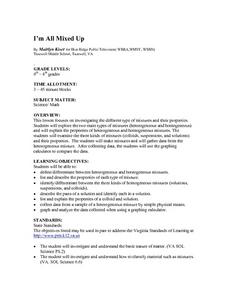Curated OER
Water Cycle Reading and Writing
After listening to a story about the water cycle, learners create their own versions of this tale. This is a great way to have your class review the concepts of evaporation, condensation, precipitation, and runoff.
Wild BC
The Greenhouse Effect: Warming the Earth Experiment
First in a two-part lesson on the greenhouse effect, this lesson involves a classroom demonstration of the phenomenon, and a lab group experiment with color and absorption. Although there are easier ways to demonstrate the greenhouse...
Virginia Department of Education
Solution Concentrations
What happens when you combine 6.022 times 10 to the 23 piles of dirt into one? You make a mountain out of a mole hill. Scholars use dehydration to obtain percent composition and then calculate the molarity of the original...
NASA
Gravitational Waves
Young scientists participate in a hands-on experiment to explore Einstein's theory of relativity in a creative manner. They investigate various waves and compare their characteristics as they discuss how each wave is created....
Santa Monica College
Single and Double Displacement Reactions
If you aren't part of the solution, you are part of the precipitate! Young chemists learn about single and double displacement reactions including precipitation reactions, neutralization reactions, and gas forming reactions. They perform...
NASA
Model Development Assessment Activity
Time to show off what they've learned! The final lesson in the series of six asks young scholars to process their learning from the previous lessons. They identify possible elements of the sun as well as a possible origin.
Purdue University
Design of a Door Alarm
How does electricity work? Budding scientists explore the concepts of electrical currents and open and closed circuits with class discussion and a hands-on activity using a battery to turn on a light bulb. Learners also make predictions...
Curated OER
Scientific Detectives
Middle schoolers examine the legitimacy of advertisers' claims about products using science and critical thinking. They view and discuss ads, read a case study, and conduct an experiment to demonstrate whether a product lives up to its...
Curated OER
Plants in Your Gas Tank: From Photosynthesis to Ethanol
Explore ethanol and how it is produced. Young scientists investigate photosynthesis and fermentation to the concept of conservation of energy and mass. They discuss the environmental and economical benefits of ethanol as a fuel additive.
Curated OER
Water Cycle Reading and Writing
Here is a great way to get pupils to express a scientific concept in a fun way. After hearing the story of Walter the Water drop and learning facts about the water cycle, the class will write a creative expository piece describing what...
American Chemical Society
The Discovery of Fullerenes
Carbon is the most common element on earth, so the innovative discovery of a new type of carbon molecule won the 1996 Nobel Prize. In the ready-to-go lesson, scholars learn about C60 and how it has opened up the entire area of...
Lawrence Hall of Science
Photolithography
Examine the use of photolithography in the fabrication of circuit boards and other components. An advanced activity teaches pupils a process for transferring a pattern onto a surface. Using UV light and a light reactive substance,...
Cornell University
Discovering Enzymes
Explore the function of enzymes through a series of lab investigations. Learners use household enzymes such as hydrogen peroxide to model the role of enzymes. The enzymes break down proteins with and without a catalyst.
Cornell University
Light Waves: Grades 6-8
Explore the behavior of light with different materials. Collaborative groups determine whether certain materials absorb, reflect, diffract, or transmit light waves. They then measure the angle of incidence and angle of reflection.
Cornell University
Beam Focusing Using Lenses
Explore optics using an inquiry-based experimental approach! Young scholars use a set of materials to design and build a unit capable of focusing a beam of light. They experiment with different lenses to determine the best approach to...
Kenan Fellows
What Is Heat?
If objects have no heat, how do they can gain and lose it? Scholars experiment with heat, temperature, and specific heat of various substances. They create definitions for these terms based on their own conclusions to complete the fourth...
Curated OER
What Changes Occur When Ice Melts?
Young scholars explore the physical process of melting. They observe melting ice and answer questions related to energy transfer during phase changes.
Curated OER
What Changes Occur When Water Freezes?
Learners investigate the changes that occur at the molecular level when a liquid becomes a solid. They freeze water in baby jars and observe the changes that occur in the process.
Curated OER
Coal Ash Analysis
Students use ash contnet, one of the important environmental concerns, that can be determined by massing the residue remaining after buring a sample of coal under controlled conditions. They complete a lab making ash content. Students...
Curated OER
Sometimes, solid + liquid = gas
Third graders experiment with common household liquids and solids. In this chemical reaction lesson plan, 3rd graders discuss phase changes and experiment to find other ways to create gases. They use water, vinegar, lemon juice, flour,...
Curated OER
I'm All Mixed Up
Middle school scientists compare and contrast heterogeneous and homogeneous mixtures. They differentiate solutions, colloids, and suspensions by examining samples of each. Note that the bulk of the lesson plan directs you how to...
Curated OER
Vectors: Follow That Arrow
Vectors and their connection to motion. A video will be presented to provide information for the class to use methods of solving vectors with and without grids. Real-world physical concepts will be explored in reference to vectors.
University of Minnesota
The Ladder of Torture
The awful practice of torture is the focus of this sociology lesson. Young scholars examine their own personal values regarding torture. They participate in a class discussion that considers the moral issues surrounding the use of...
Curated OER
Estimation Task
Upper graders practice their estimation skills by observing different objects then making their best guess without using measuring instruments. Students are asked to estimate mass, length, volume, and area.
Other popular searches
- Properties of Matter
- Physical Properties of Matter
- Properties of Matter Song
- Useful Properties of Matter
- Science Properties of Matter
- Properties of Matter Booklet
- Properties of Matter Lecture
- Compare Properties of Matter
- Chemical Properties of Matter
- Social Properties of Matter
- Properties of Matter Test
- Intensive Properties Matter



